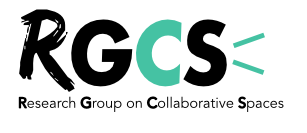Coworkers, Makers & Hackers: True Opportunities to Renew Work Practices and Entrepreneurship?
2nd International RGCS Symposium [#RGCS2018]
Thursday, 18th and Friday, 19th January 2018 at UCL, Cass Business School & Dauphine London – London (UK)
Topics of the second symposium
This second RGCS symposium will focus on the relationship between the corporate world, collaborative movements (i.e. co-workers, makers, hackers and the fab lab network) and new work practices.
On the one hand, it seems that management and consultants bring high expectations to their work with collaborative techniques and exponents of collaborative movements. Hackathons, corporate hacking, open knowledge, communities, ‘labs’, have all recently entered the contemporary managerial vocabulary and practices. They are expected to be at the heart of new innovative and strategic practices such as disruptive or open innovation. Industry is also increasingly investing in collaborative environments. Coworking spaces are thus increasingly designed and owned by real estate companies, and corporate sponsors support maker and hacker spaces in apparent need of these resources and the legitimacy they bring.
On the other hand, some actors of collaborative movements criticize the superficial and opportunistic use of collaborative values. For example, hackers defend an ethic which is interesting from a governance point of view (beyond the punctual ‘use’ of hackathons). Makers defend ‘repair’ logics which are seen as a profound alternative to capitalist notions of fast innovation and hyper-consumption.
What are the relationships between collaborative movements and the corporate world? How do coworkers, makers and hackers contribute to new work practices in corporations and new forms of entrepreneurship? Are makers and hackers the muse or the nemesis of managers? Are the two in a dialogical relationship, in conflict, or even mutually interdependent in today’s urban professional life?
This second symposium will also be an opportunity for critical perspectives on collaborative movements, collaborative techniques and their translation in the world of management. New work and management practices associated to collaborative workplaces (e.g. digital nomads, telework, co-working, distributed work) raise novel tensions and paradoxes in control and surveillance issues that need to be explored at greater depth. Therefore new domination, control and surveillance practices will also be at the heart of our discussions. Here are the issues we would like to cover (this list is non-exhaustive):
- Collaborative movements and their relationships with the corporate world: as mutual sources of innovation, legitimation, transformation;
- Collaborative practices in the context of corporate coworking or maker spaces and independent coworking and maker spaces;
- Repair, DIY, DIT, maker movements and their relationship with society, organizations, organizing, politics and their joint transformations;
- Fab labs as networks, contributors to open knowledge and their translation in a corporate environment;
- Spatial, temporal, visual and material dimensions of the relationships between the collaborative and corporate worlds;
- The legitimation and co-legitimation of collaborative techniques, collaborative communities and corporate projects in organization and society;
- How spaces, time, bodies are involved in the legitimation processes and practices of corporate techniques in the collaborative environment, or collaborative techniques in the corporate environment;
- Historical views on firms, corporate environments and collaborative movements. Comparative historical perspectives on the two phenomena;
- Critical perspectives on the ‘use’ of collaborative techniques and collaborative values in a corporate world;
- Joint emergence of new work practices in corporate and collaborative worlds;
- Institutional, practice, process, phenomenological, Marxist, post-Marxist, discursive, aesthetic, critical views on both phenomena and their joint evolution;
- Ideologies, myths of the collaborative and sharing economies and how they feed the corporate world. Conversely, how the corporate world is renewed or maintained by the sharing economy and the collaborative economy;
- Affordance and proximity in and of collaborative spaces in the city, and how they relate to traditional business districts;
- Boundary-spanner issues between corporate world, third places and the city;
- Open innovation and how it is grounded, justified, fed by transformations introduced by collaborative communities.
Twitter: @collspaces
LinkedIn: Research Group on Collaborative Spaces (RGCS)
#LIVE2018!
#RGCS2018 Thank you sooo very much to all of you 😍 @collspaces and many thanks to @fdevaujany #OWEE pic.twitter.com/KBYdfI6VAo
— Aurore Dandoy (@AuroreDandoy) January 19, 2018
#RGCS2018 If you can’t join us but want to see our collaborative exhibition visit https://t.co/k9LcYqi81E pic.twitter.com/ikjoUgh7h2
— David VALLAT (@DavidVALLAT) January 19, 2018
Our last destination of the day: #RawLabs at Albert Royal Wharf #RGCS2018 #OWEE #London pic.twitter.com/Q7AMtcnzKH
— Annelise Meyer (@AMChronicles) January 19, 2018
@fdevaujany @DavidVALLAT and Tadashi ... visual hacking Tokyo exhibition in london during #RGCS2018 @collspaces pic.twitter.com/oDdKvEJPMA
— Anna Glaser (@AnnaGlaser007) January 19, 2018
At the amazing space of Royal Albert Wharf @BowArts #RGCS2018 pic.twitter.com/SejCWSATf4
— stefan haefliger (@HAEFLIGER) January 19, 2018
Pub at Heathrow... same aesthetics as collaborative workspaces... #RGCS2018 @nada_endrissat pic.twitter.com/tBp42pHfS0
— Lucia Crevani (@LuciaCrevani) January 19, 2018
Last stop @rowlabco #rgcs2018 @collspaces pic.twitter.com/GWw7WWh9FH
— F-Xavier de Vaujany (@fdevaujany) January 19, 2018
Take time. Mind your wellbeing. Don’t be your own afterthought ! @collspaces #RGCS2018 pic.twitter.com/ybeDESGcof
— Anna Glaser (@AnnaGlaser007) January 19, 2018
#OWEE #rgcs2018 The Ens of the walk... pic.twitter.com/3aVYLt7Xlg
— David VALLAT (@DavidVALLAT) January 19, 2018
Dernière ligne droite pour #RGCS2018 restitution de la learning expedition à Tokyo #OWEE @DavidVALLAT @collspaces pic.twitter.com/4WBAp65yu0
— Ingrid Fasshauer (@IFasshauer) January 19, 2018
